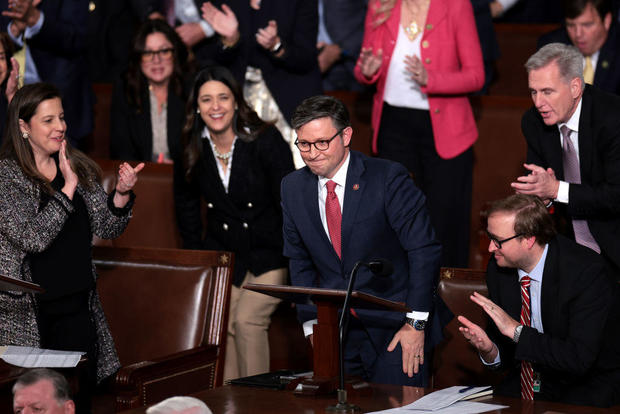Washington — Rep. Mike Johnson, a little-known Republican lawmaker from Louisiana, is now second in line for the presidency after winning a vote to become the next speaker of the House, more than three weeks after Rep. Kevin McCarthy’s ouster left the chamber without a leader.
Johnson prevailed after a chaotic process that saw three other GOP nominees fail to unite the party and secure a majority. He won 220 to 209 in the House vote on Wednesday with unanimous support among Republicans, who enjoy a slim majority in the chamber.
A member of Congress since 2017, Johnson has no experience in the House leadership, but vowed to hit the ground running and get the House back to work. A government shutdown is fast approaching, and the White House has requested a $106 billion emergency aid package for Israel, Ukraine and other priorities.
“We’re going to dispense with all the usual ceremonies and celebrations that traditionally follow a new speakership because we have no time for either one,” Johnson said after the vote. “The American people’s business is too urgent in this moment. The hour is late. The crisis is great.”
Johnson has laid out a tentative legislative schedule to approve new spending and take up other pieces of legislation, but things could change quickly as he confronts the realities of governing, especially given the fractious nature of the Republican conference.
Here’s what comes next, now that the House finally has a speaker:
Avoiding a government shutdown
Win McNamee/Getty Images
As speaker of the House, Johnson will have final say over what bills make it to the floor. Funding the government past a deadline of Nov. 17 is the most pressing item on the agenda.
Johnson sent a letter to his colleagues on Monday laying out a tentative schedule for how he would approach the next several months’ worth of House business. He endorsed a plan to bring up 12 individual spending bills, rather than a single massive piece of legislation to fund executive branch departments. The consideration of individual spending bills was one of the demands made by GOP Rep. Matt Gaetz of Florida and other who rebelled against McCarthy when he endorsed a temporary extension of government funding.
“This is an ambitious schedule, but if our Speaker can work across the Conference to unify our membership and build consensus, we can achieve our necessary objectives,” Johnson wrote.
Johnson proposed taking up individual bills between now and Nov. 17, when current funding expires. He said another stopgap measure — known as a continuing resolution — might be needed to prevent the Senate from “jam[ming] the House with a Christmas omnibus,” referring to a consolidated spending bill. He said a continuing resolution could have a deadline of Jan. 15 or April 15, depending on the consensus in the GOP conference.
Gaetz seemed receptive to Johnson’s plan on Monday, calling it “quite attractive.” The Florida Republican voted for Johnson in Wednesday’s vote, along with all other Republican members.
Of course, any spending bills would require passage in the Democratic-controlled Senate and President Biden’s signature, and drastic Republican-backed spending cuts would be dead on arrival. His plan envisions beginning negotiations on spending in October, and acknowledges they could continue until April.
Mr. Biden welcomed news of Johnson’s election and said in a statement that both sides “need to move swiftly to address our national security needs and to avoid a shutdown in 22 days.”
“Even though we have real disagreements about important issues, there should be mutual effort to find common ground wherever we can,” the president said. The two men spoke on the phone Wednesday afternoon, according to the White House.
GOP Rep. Scott Perry, a conservative member from Pennsylvania, said Tuesday that members will likely give Johnson some leeway on government spending bills.
“We’re in overtime right now, right? So you don’t blame the backup quarterback for the failures of the guy that just came out of the game,” Perry told reporters.
Denouncing Hamas, and approving aid for Israel and Ukraine
JALAA MAREY/AFP/Getty
Johnson said his first priority would be to pass a resolution denouncing Hamas for the Oct. 7 attacks in Israel that left more than 1,400 people dead. Israel is said to be preparing for a ground offensive in the Hamas-controlled Gaza Strip, and lawmakers have been anxious to show support for the key U.S. ally as the speaker’s fight dragged on.
The House moved quickly to take up the resolution, scheduling a vote on the measure for Wednesday afternoon. Johnson said the House is “overdue in getting that done.”
The White House has requested an emergency aid package worth $106 billion, which would include $14 billion in aid to Israel. The administration also wants $61 billion to fund further aid to Ukraine and replenish U.S. stockpiles of weapons and ammunition. That has already emerged as a sticking point with some Republicans who want to consider aid to Israel separately.
Johnson’s blueprint for the next several weeks did not mention taking up an aid package, but he said Wednesday that it’s a “top priority.”
“We’ll be talking about the support and what’s necessary to get it. We have to ensure that Vladimir Putin is not successful and I think all the House Republicans are united in that cause,” he told reporters, despite opposition from many Republicans to more aid for Ukraine. “We’ll be talking about how that’s going to be done here in the coming days and it’s a top priority.”
A bipartisan debt commission
Speaking to the chamber after his election, Johnson said the U.S. must rein in government spending and address the growing national debt, which he called “the greatest threat to our national security.”
“It’s unsustainable. We have to get the country back on track. This is not going to be an easy task, and tough decisions will have to be made. But the consequences if we don’t act now are unbearable,” he said.
Johnson said lawmakers “have a duty to the American people to explain this to them so they understand it well, and we are going to establish a bipartisan debt commission to begin working on this crisis immediately.”
The new speaker did not elaborate on what the commission might specifically be tasked with, or who might be tapped to serve on it.
Passing a farm bill
Congress passes a package of legislation that sets policy for agricultural and food programs, known as the farm bill, every five years. The most recent package was approved in 2018 and expired Sept. 30, though some of its provisions remain in place, according to the Department of Agriculture.
Work on the farm bill has been ongoing. The House and Senate Committees on Agriculture have been holding field hearings, and the Republican and Democratic leaders of those panels met with Mr. Biden in May to discuss the importance of passing the legislation this year.
In his blueprint for the rest of the 118th Congress, Johnson proposed the House take up the farm bill in December and begin negotiations with the Senate “as soon as possible” following action by the upper chamber.
Reconciling the NDAA
In July, the House passed its version of the must-pass defense policy bill, which included a number of conservative policy priorities on abortion, health coverage for transgender service members, and diversity, equity and inclusion programs.
The legislation, titled the National Defense Authorization Act, typically earns wide bipartisan support and has passed Congress each year for more than six decades. But the House bill won approval in a near-party-line vote of 219-210. Four Republicans voted against the bill, while four Democrats voted for it.
The Senate passed its own version shortly after the House acted, and members from both chambers are now working to reconcile the two versions and craft a consensus bill.
In his proposed schedule for the current Congress, Johnson said passing the final version of the NDAA would take place in December.
Determining the next steps in the Biden impeachment inquiry
McCarthy announced in September that he would be opening a formal impeachment inquiry into Mr. Biden focused on allegations that he benefited financially from his family members’ foreign business dealings. Republicans have presented no direct evidence of wrongdoing by the president since they began looking into the Biden family’s overseas work after taking control of the House in January.
A single hearing has been held as part of the impeachment effort, by the House Oversight Committee in late September. During the proceeding, law professor Jonathan Turley, who was a witness for the GOP majority, said he did “not believe that the current evidence would support articles of impeachment.”
“That is something that an inquiry has to establish,” he said. “But I also do believe that the House has passed the threshold for an impeachment inquiry into the conduct of President Biden.”
Republicans could continue with their inquiry and ultimately decide not to bring articles of impeachment against the president. Johnson said in September that he supported the inquiry.
“Barring declarations of war, impeachment is the most awesome power Congress holds, and we will undertake this great responsibility with a strict fidelity to the truth,” he said in a statement at the time. “It is time to get to work.”
Jack Turman and Nikole Killion contributed reporting.

